The Role of Privacy Policies in Medical Website Trust
Building Trust Through Transparent Data Privacy Practices in Healthcare Websites


The Role of Privacy Policies in Medical Website Trust
Understanding the Critical Role of Privacy Policies in Healthcare Online Platforms
In an increasingly digital healthcare landscape, privacy policies serve as foundational elements that influence patient trust and confidence. As sensitive health data becomes a pivotal component of personalized care, ensuring privacy through comprehensive policies not only meets legal requirements but also fosters a trustworthy environment where patients feel secure sharing their information. This article explores how privacy policies influence user perceptions, the key elements that strengthen trust, and best practices for healthcare organizations to develop effective privacy frameworks.
Importance of Privacy Policies in Healthcare Websites
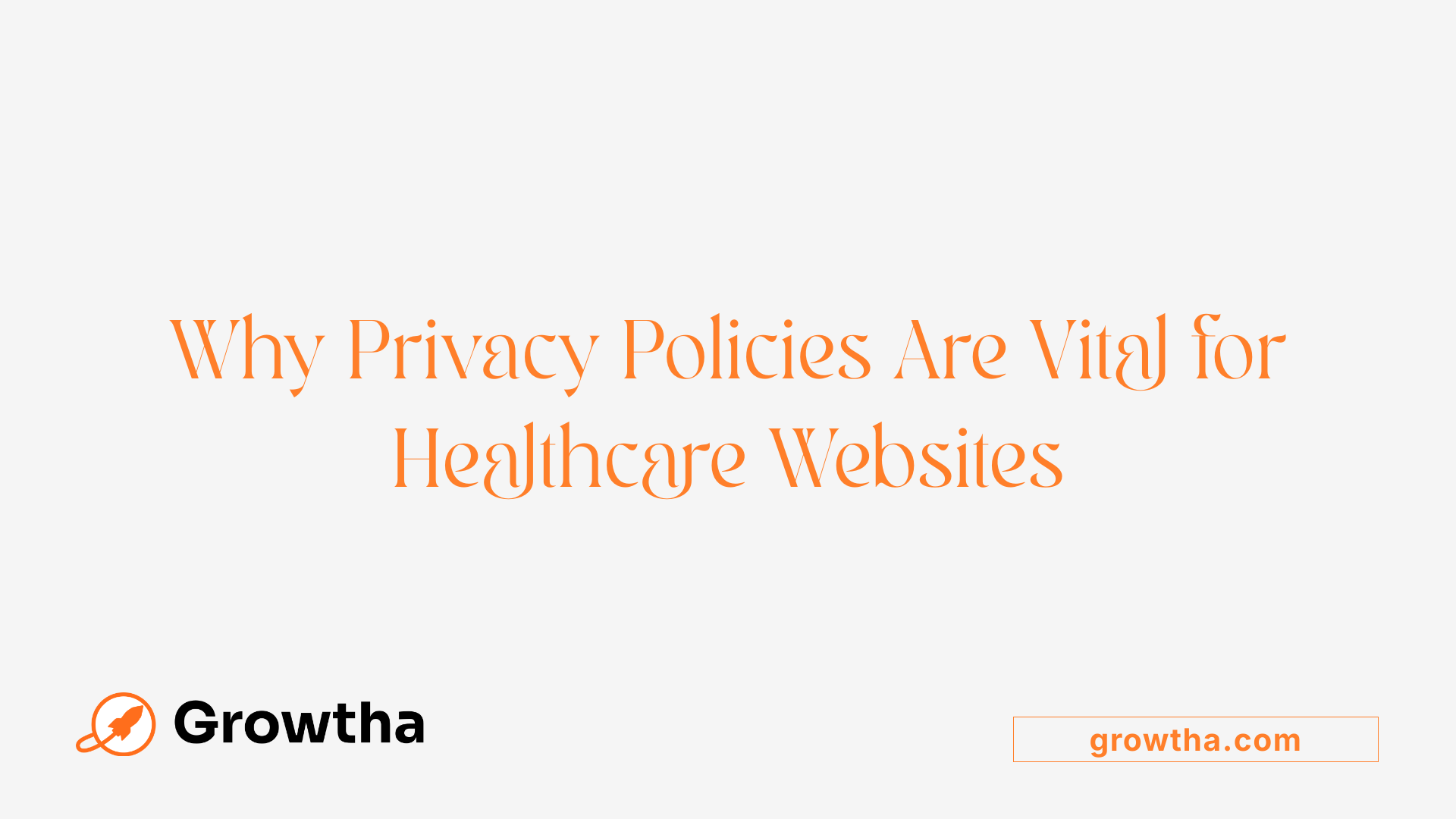
Why are privacy policies important for healthcare and medical websites?
Privacy policies play a crucial role in healthcare websites by providing transparency about how personal health information is handled. They inform users about what data is collected, how it is used, and who it might be shared with, fostering a sense of trust and confidence.
Compliance with laws such as the Health Insurance Portability and Accountability Act (HIPAA), the General Data Protection Regulation (GDPR), and the California Consumer Privacy Act (CCPA) is mandatory for many healthcare providers and related organizations. These regulations outline specific standards for data collection, security, and user rights, and non-compliance can lead to hefty fines, legal penalties, and loss of reputation.
A well-crafted privacy policy demonstrates a commitment to safeguarding patient data and reflects best practices in data security. It explicitly details security measures like access controls and encryption, which are vital for protecting against cybersecurity threats and data breaches.
Furthermore, transparency about data practices aligns with ethical principles, empowering patients to make informed decisions about their personal information. It also clarifies patients’ rights to access, correct, or delete their data, which is essential for maintaining ethical standards in healthcare.
Regularly updating privacy policies ensures they stay aligned with evolving laws and technological advances. This continuous compliance helps build long-term trust, encouraging patients to share sensitive health information vital for personalized care.
In sum, comprehensive privacy policies are not just legal requirements; they are foundational to ethical, secure, and transparent healthcare delivery on digital platforms.
Legal Frameworks That Shape Privacy Policies
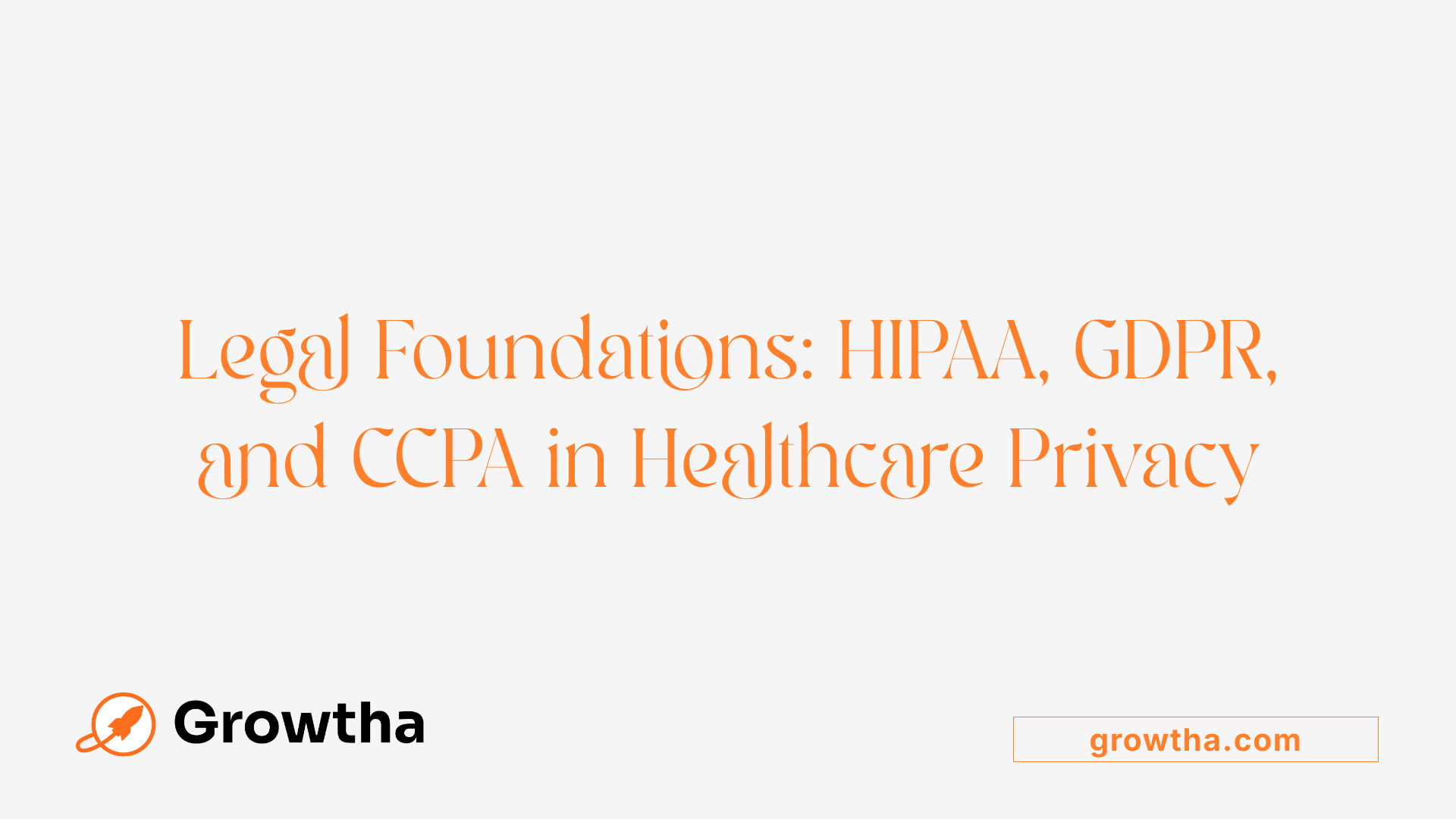
What legal protections, such as HIPAA, contribute to privacy policies and user trust?
Legal protections like the HIPAA Privacy Rule and Security Rule play a crucial role in shaping privacy policies and enhancing user trust in healthcare systems. Enacted in 1996, HIPAA established comprehensive standards for safeguarding electronic protected health information (ePHI). The Privacy Rule mandates organizations to develop clear policies on data collection, access, and disclosure, ensuring transparency and giving patients control over their health information.
The Security Rule complements this by requiring robust administrative, physical, and technical safeguards to protect data from unauthorized access and breaches. These regulations not only set the legal baseline for privacy and security but also demonstrate a healthcare provider’s commitment to protecting patient data.
When organizations adhere to HIPAA standards, they can reassure patients that their sensitive health information is handled responsibly. This transparency and compliance foster increased confidence, reducing fears of data misuse or breaches. Overall, legal protections like HIPAA are fundamental in establishing trustworthy healthcare environments where patients feel secure sharing their personal information.
| Law/Regulation | Main Focus | Impact on Privacy Policies | Scope |
|---|---|---|---|
| HIPAA Privacy Rule | Confidentiality of PHI | Sets standards for data use and disclosure | Covered entities (healthcare providers, plans) |
| HIPAA Security Rule | Data security | Requires safeguards for electronic data | Healthcare organizations, business associates |
| GDPR | Data protection in the EU | Ensures transparency and user rights | Any organization processing EU residents' data |
| CCPA | Consumer privacy rights | Empowers consumers with control over data disclosures | Businesses handling California residents’ data |
By complying with these regulations, healthcare providers can enhance the integrity of their privacy policies, ultimately strengthening patient trust and supporting a secure, transparent healthcare data environment.
Transparency as a Cornerstone of Trust
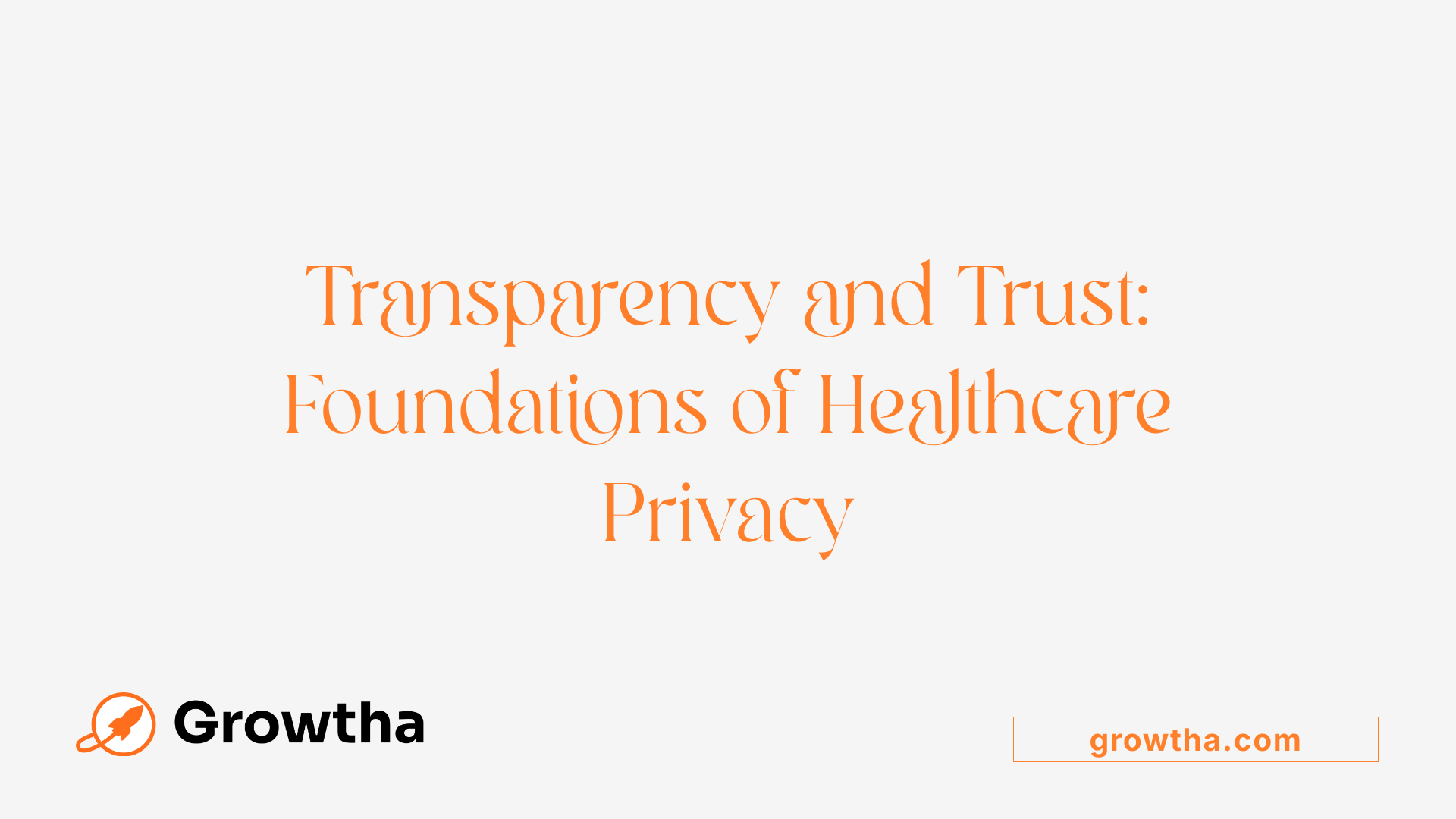
Why is transparency in privacy policies crucial for users of healthcare websites?
Transparency in privacy policies plays a vital role in building and maintaining trust between healthcare providers and patients. When patients can clearly understand how their sensitive health data is collected, used, and shared, they feel more confident in the security and integrity of their information.
Open communication about data practices includes detailed disclosures of security measures and data handling procedures, which reassures users that their information is protected against unauthorized access and breaches. For instance, reputable organizations like the American Hospital Association (AHA) and HealthTrust explicitly state how they collect, utilize, and safeguard personal data.
Patients also value awareness of their rights, such as to access, correct, or delete their data. Clear policies enable users to exercise control over their personal information, aligning with legal requirements from laws like HIPAA, GDPR, and CCPA. These rights foster accountability and empower patients to manage their privacy preferences.
Moreover, transparency involves educating users about data practices through accessible information. This helps individuals make informed decisions and reduces anxieties related to data misuse, sale, or discrimination. As studies show, over 80% of respondents trust healthcare providers to protect electronic health data, especially when privacy practices are openly communicated.
In summary, transparent privacy policies are essential for fostering trust, ensuring compliance with regulations, and supporting a responsible healthcare system. They promote open dialogue, uphold patient rights, and contribute to better health outcomes by encouraging honest sharing of health information.
The Impact of Privacy Policies on Trust Formation
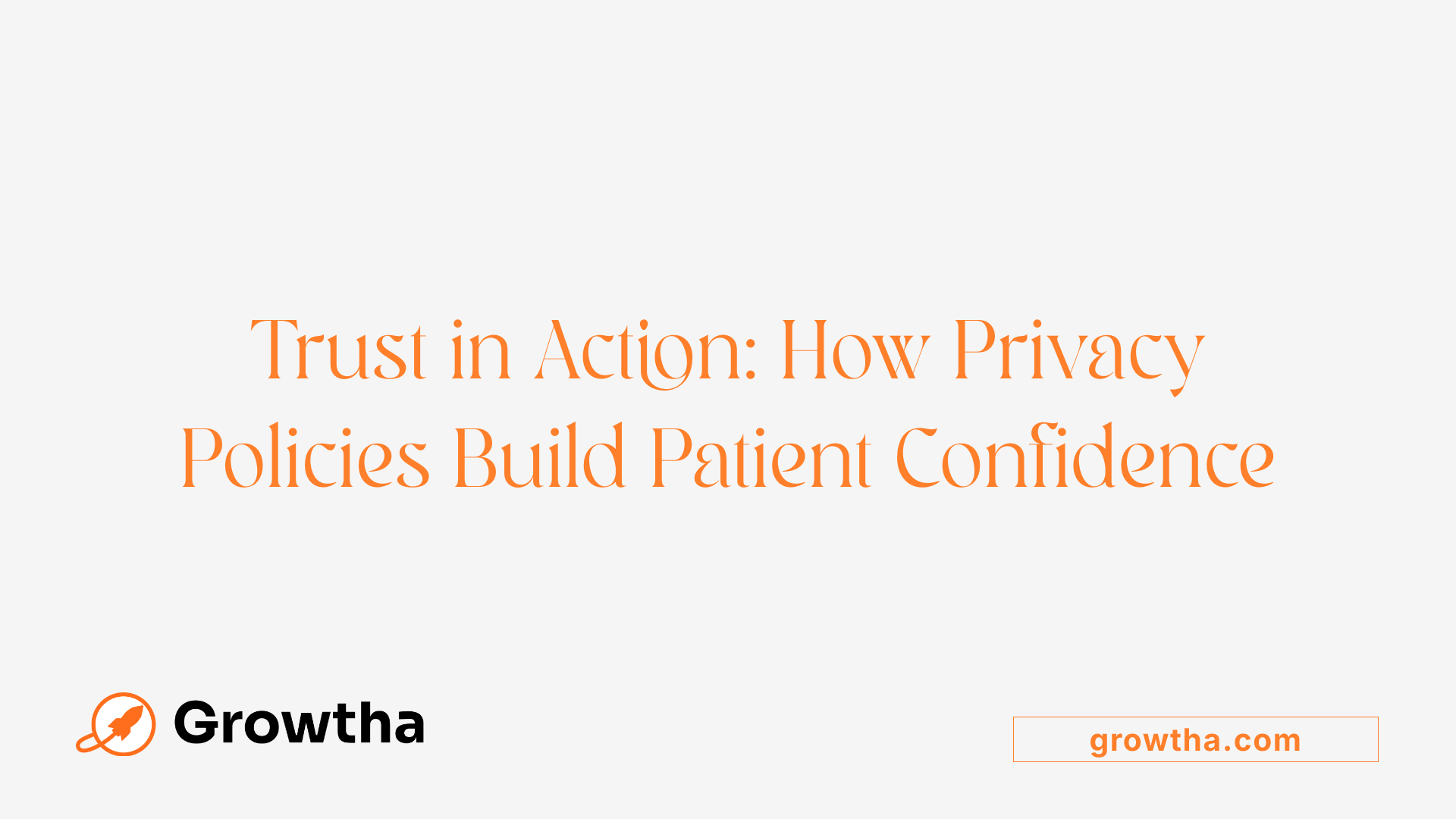
How do privacy policies influence user trust and confidence online?
Privacy policies play a crucial role in shaping user trust, especially within healthcare information exchanges (HIEs). They work to communicate how personal and sensitive health data is collected, used, and protected. When privacy policies are transparent, comprehensive, and easy to understand, users are more likely to believe that their data is in safe hands. This transparency includes clear explanations of security measures, data sharing practices, and their rights to access and control their information.
Perceived transparency—knowing what happens to their data—significantly boosts trust. For instance, when patients see explicit details about data handling and security safeguards, they develop confidence in the organization’s competence and integrity. Studies show that perceived transparency of privacy policies directly increases cognitive trust in both the competence and the honesty of a health information exchange, with a notable impact on patients' willingness to disclose sensitive health information.
Furthermore, trust is influenced by the perceived competence and integrity of the organization. If users believe that a healthcare provider or platform adheres to strict privacy standards, they are more comfortable sharing information. This is especially important because trust in healthcare providers also positively solidifies trust in the data exchange systems they utilize.
Trust is not solely cognitive. Emotional trust—patients’ feelings of safety and confidence—also depends on the organization’s transparency and perceived reliability. Higher emotional trust correlates strongly with an increased likelihood of patients opting in to data sharing and willingly providing comprehensive health information.
The relationships between transparency, trust, and user behavior are complex and influenced by trust in healthcare providers. When patients trust their providers, the impact of transparent privacy policies becomes even more profound, enhancing overall confidence in health data exchanges.
In summary, transparent privacy policies are fundamental for establishing trust in online healthcare systems. They reassure users that their data is protected, thereby encouraging active participation and honest disclosure, which are essential for effective health management and research.
Perceived Transparency and Trust in Health Information Exchanges
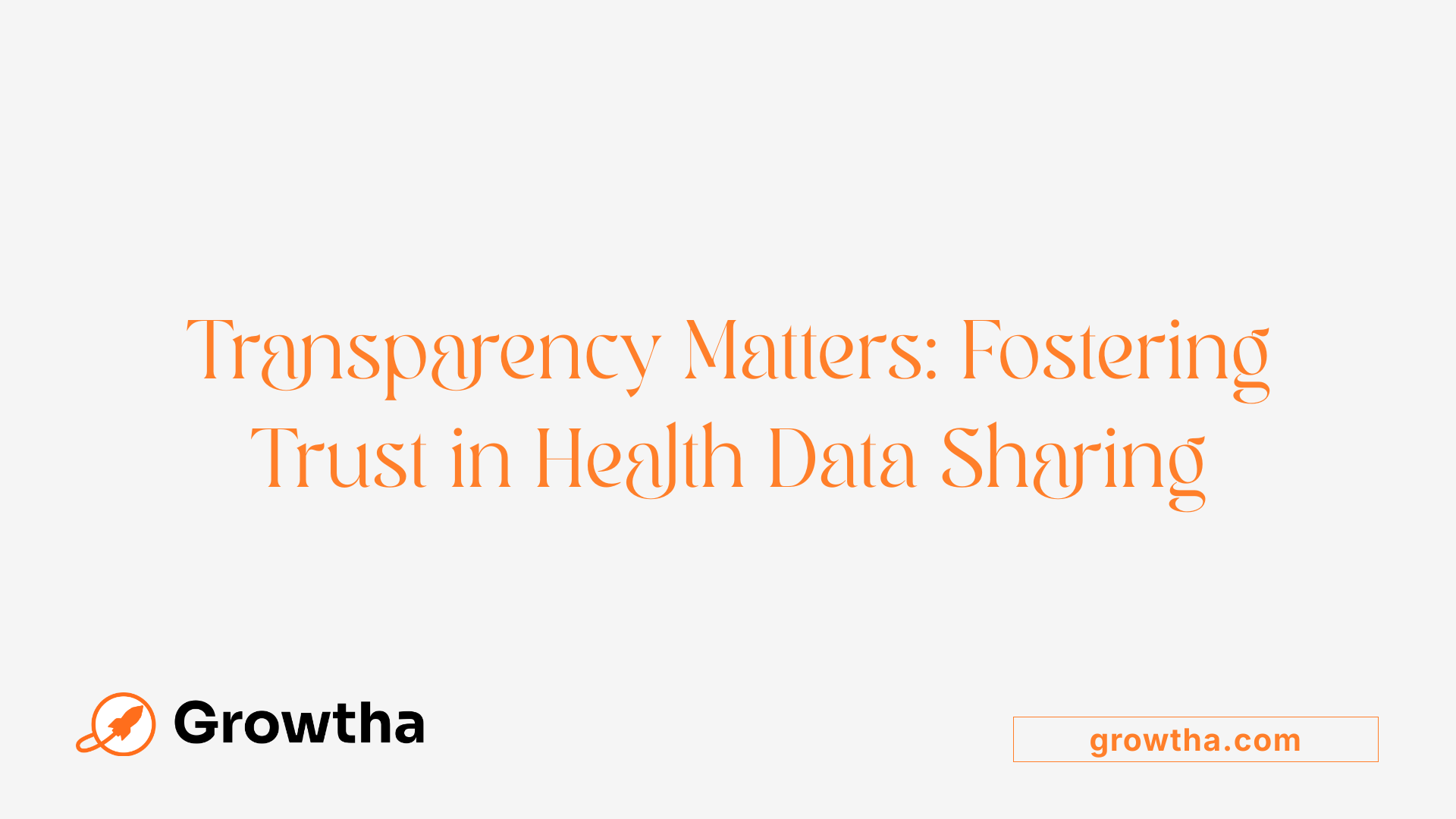
How do privacy policies help healthcare providers meet ethical standards and promote patient confidence?
Privacy policies are fundamental tools that help healthcare providers adhere to high ethical standards by clearly defining how patient information is collected, used, and protected. They serve as a transparent framework that underscores the provider’s commitment to confidentiality and patient rights.
Effective privacy policies specify security practices, including encryption and access controls, which ensure that sensitive health data remains safe from unauthorized access or breaches. Compliance with regulations like HIPAA, GDPR, and CCPA not only meets legal obligations but also demonstrates accountability and respect for patient autonomy.
Transparency is fostered when patients are informed about data handling and given options to control their personal information. This openness supports better communication, as patients trust that their data is managed responsibly. When health organizations communicate clearly and consistently about their privacy practices, it encourages patients to share truthful and comprehensive health information.
Moreover, well-crafted policies promote ethical stewardship of health data, which is especially important in digital health environments where data sharing and technology use are expanding rapidly. They also improve public confidence, making patients more willing to participate in health research, opt into electronic health exchanges, and disclose sensitive issues without fear of misuse.
In summary, comprehensive privacy policies uphold ethical standards by safeguarding patient dignity, ensuring legal compliance, and building trust. This foundation of transparency and responsibility is essential for delivering quality healthcare, fostering patient engagement, and supporting advances in medical research.
Patient Behavior and Perceptions of Privacy Risks
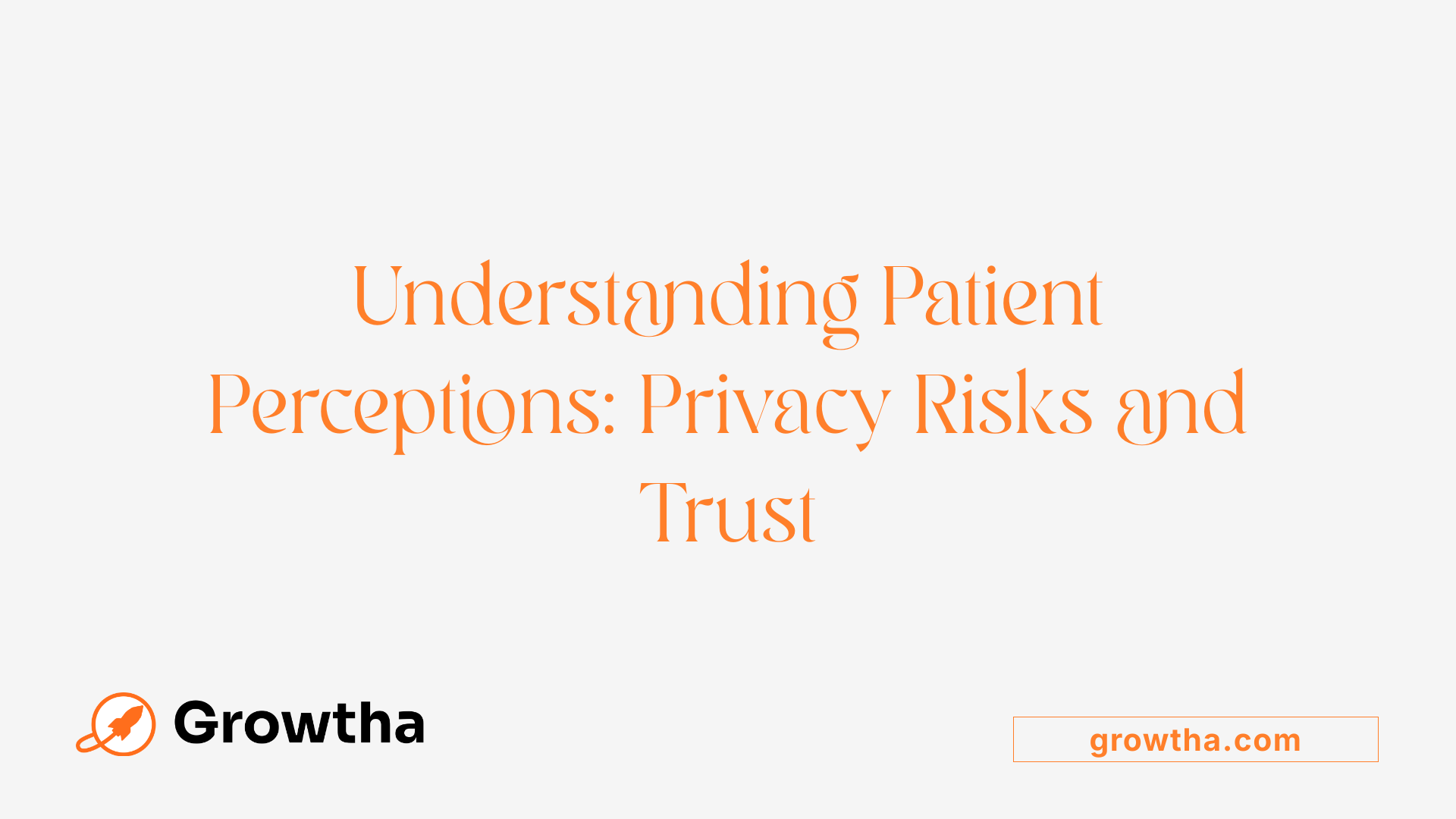
How does perceived transparency of privacy policies influence patient trust?
Perceived transparency of privacy policies plays a significant role in shaping patient trust in health information exchanges (HIEs). When patients believe that the privacy policies are clear, comprehensive, and openly communicate how their data is handled, their cognitive trust in the HIE’s competence increases (beta=0.31; P<.01), and their trust in its integrity rises even more substantially (beta=0.46; P<.001). Transparency about security protocols and data sharing procedures encourages patients to develop confidence in the system.
How does trust in healthcare providers affect trust in health information exchanges?
Trust in healthcare providers positively influences patients' trust in HIEs. Specifically, patients who trust their physicians are more likely to perceive the HIE as competent (beta=0.24; P<.01) and trustworthy in terms of integrity (beta=0.41; P<.001). Such trust in providers enhances cognitive trust in the system, as patients believe their health data will be managed responsibly.
In what ways does cognitive trust impact emotional trust and patient willingness?
Cognitive trust, which includes trust in the competence and integrity of the HIE, significantly affects emotional trust — the emotional confidence patients feel towards the system. For example, trust in competence (beta=0.52; P<.001) and integrity (beta=0.34; P<.01) both foster emotional trust. When emotional trust is high, patients are more likely to opt-in for health data sharing (beta=0.61; P<.001) and are willing to disclose sensitive health information (beta=0.57; P<.001). These emotional components are crucial for encouraging health data exchange.
How do trust levels influence perceptions of privacy risks?
Patients with higher trust levels perceive lower risks associated with data breaches. For instance, they estimate the likelihood of unauthorized access as only 26.6%, compared to 59.3% among those with lower trust. Similarly, high-trust individuals see the consequences of data breaches as less severe (30.3%) versus 54.0% among low-trust respondents. This perception encourages more open sharing of personal health information.
What is the role of trust moderation in privacy perceptions?
Trust in healthcare providers moderates how perceived privacy transparency influences trust outcomes. When trust in providers is high, the positive effects of transparent privacy policies on cognitive and emotional trust are amplified. Conversely, lower trust in providers diminishes this impact, underscoring the importance of fostering complete trust in all facets of healthcare.
Why is adherence to privacy policies critical?
Strict implementation of privacy policies, guided by regulations such as HIPAA, GDPR, and CCPA, is fundamental for building patient trust. These laws mandate transparency, patient rights, and security standards that reassure patients about the safety of their data, ultimately encouraging data sharing and active participation in healthcare programs.
| Aspect | Impact on Patient Trust | How It Works | Regulatory Foundations |
|---|---|---|---|
| Transparency of privacy policies | Boosts trust in competence and integrity | Clear communication and openness about data practices | HIPAA, GDPR, CCPA |
| Trust in healthcare providers | Enhances trust in HIE | Reliance on provider's commitment to data protection | HIPAA compliance |
| Emotional trust | Increases willingness to share data | Fosters confidence in system safety | Ethical standards and best practices |
| Perceived risk of breaches | Lowers perceived risk | Trust reduces fear of data misuse | Risk management protocols |
Understanding these relationships helps healthcare organizations design policies and communication strategies that foster trust and encourage patient engagement, especially in digital health environments.
Best Practices in Privacy Policy Development

How can healthcare organizations develop effective privacy policies?
Creating effective privacy policies for healthcare websites demands transparency and compliance with legal standards. Transparency involves clearly informing patients about how their personal data—such as names, addresses, and health information—is collected, used, and shared. Explicit consent should be obtained whenever data is used beyond basic treatment, payment, or healthcare operations.
Legal compliance requires adhering to regulations like HIPAA, GDPR, and CCPA. These laws specify requirements for safeguarding protected health information (PHI) through administrative, physical, and technical safeguards. For instance, encryption, access controls, and regular risk assessments are crucial components of effective security measures.
Organizations should also implement routine staff training to ensure all personnel understand privacy protocols and their responsibilities. Privacy impact assessments help identify potential vulnerabilities and prevent data breaches.
Another best practice is data minimization—collecting only the necessary information—and applying anonymization techniques to protect identities when feasible. These measures help reduce privacy risks and demonstrate a commitment to protecting patient data.
Regular updates to privacy policies are essential to reflect changes in practices or regulations. Maintaining notices of privacy practices and training staff continually builds trust and assures patients of ongoing compliance.
In summary, developing comprehensive privacy policies involves transparent communication, legal adherence, robust security protocols, staff readiness, and continuous policy evaluation. This approach not only fosters patient trust but also ensures organizations meet their legal and ethical responsibilities.
Role of Security Measures and Cybersecurity Standards
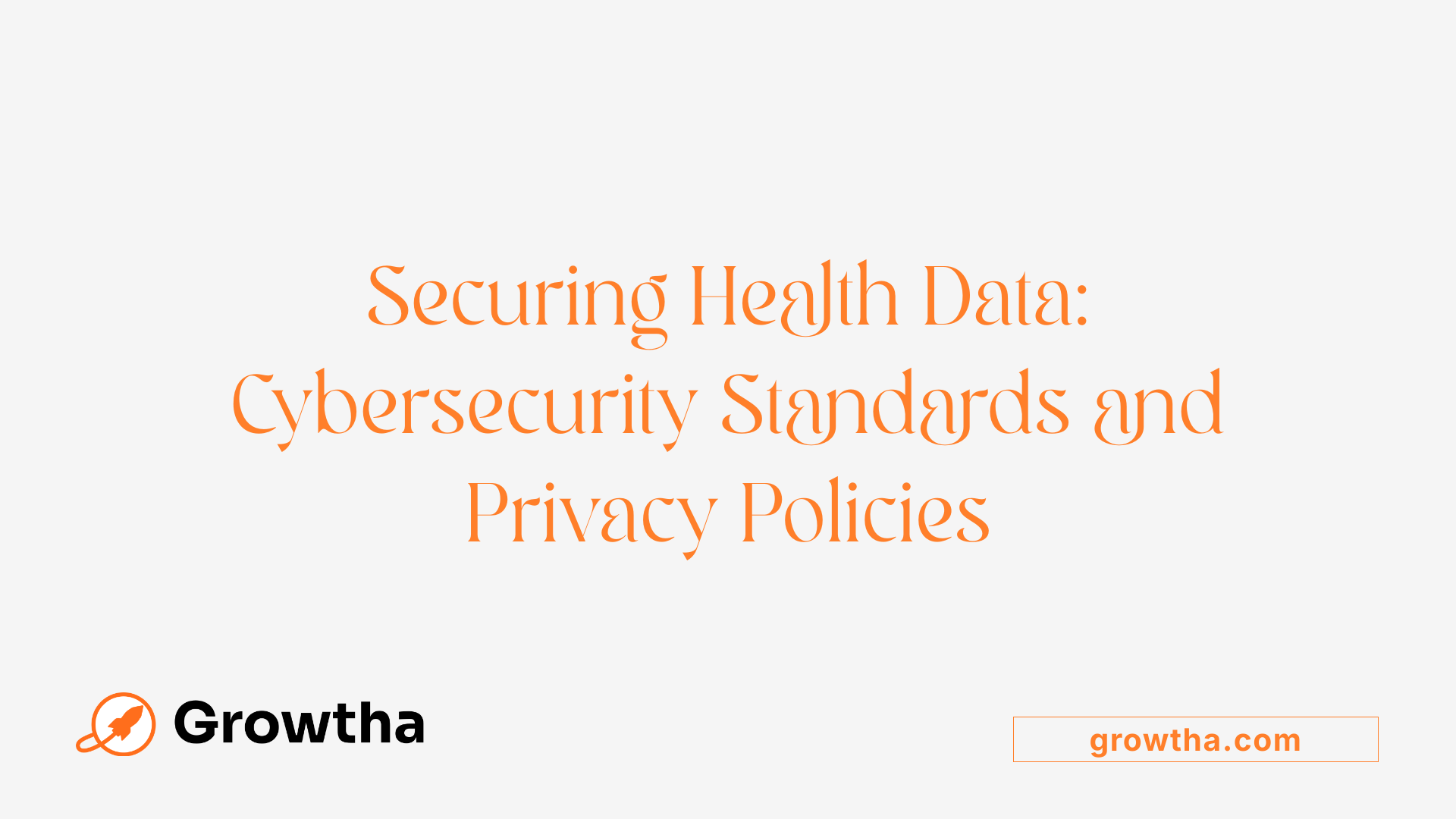
How do privacy policies help healthcare providers meet ethical standards and promote patient confidence?
Privacy policies are fundamental in guiding healthcare providers to handle patient information responsibly. They establish clear protocols for data security, confidentiality, and proper management, which align with ethical principles such as respect for autonomy and dignity. By adhering to these policies, providers demonstrate their commitment to protecting patient rights and maintaining trust.
Legal compliance is a crucial aspect of privacy policies. Frameworks such as HIPAA, GDPR, and CCPA set standards that healthcare organizations must follow. These laws mandate transparency in data practices, ensure patients can access and control their data, and require the implementation of security measures like encryption and breach response protocols.
Effective privacy policies incorporate safeguarding techniques such as encryption—making data unreadable to unauthorized users—and strict access controls that limit who can view or modify sensitive information. Staff training on breach protocols prepares employees to respond swiftly and effectively to potential data security incidents, reducing the risk of harm.
Such comprehensive policies foster transparency by informing patients about how their data is collected, used, and protected. This openness builds confidence, encouraging patients to share vital health information honestly, which is essential for accurate diagnosis and effective treatment.
Overall, well-crafted privacy policies promote ethical standards in healthcare by prioritizing patient rights, ensuring lawful data management, and implementing robust security measures. They serve as a foundation for trust that underpins effective health research, high-quality care, and active patient engagement.
The Evolution of Privacy Policies and Future Directions
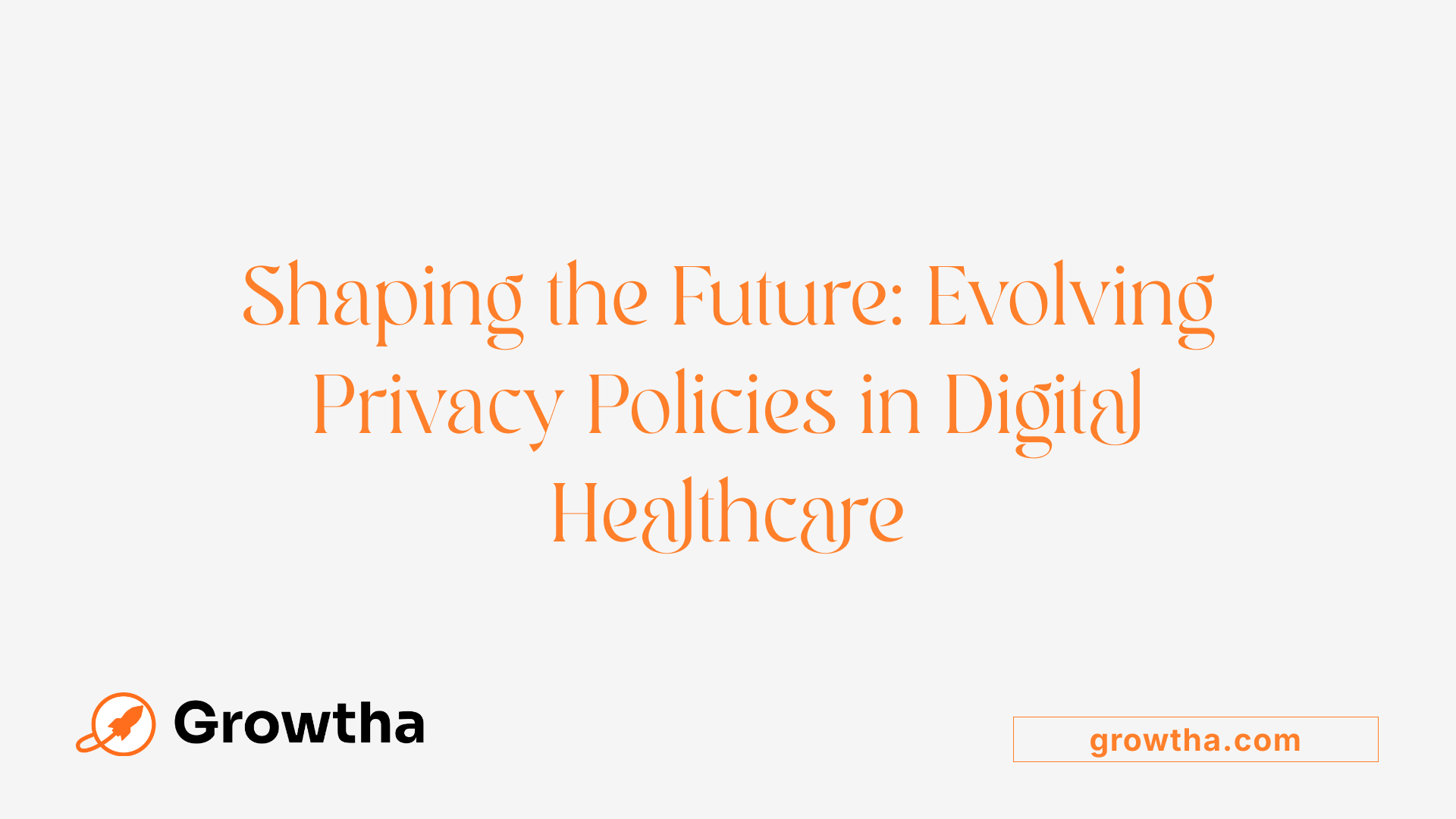
How have technological advances influenced privacy policies in healthcare?
Rapid developments in digital health technologies, such as wearable devices, mobile health apps, and electronic health records, have expanded the scope and complexity of health data management. These innovations pose new challenges for privacy policies, as data collection is more pervasive and often occurs outside traditional healthcare settings. To address this, policies now emphasize transparency in how data from various sources are gathered and used, applying frameworks like GDPR and the FTC best practices to ensure responsible data stewardship.
What regulatory changes are shaping the future of healthcare privacy?
Existing laws like HIPAA set foundational privacy standards for protected health information (PHI). However, gaps remain, especially regarding data outside traditional healthcare providers, such as social media and app developers. Recent legislative efforts, including the 21st Century Cures Act, aim to foster more integrated data sharing but also introduce privacy concerns.
New regulations are increasingly emphasizing user rights, such as access, correction, and opt-out options. The California Consumer Privacy Act (CCPA) and similar state laws further enhance transparency and control over personal data. Continuous updates to privacy policies are essential to reflect these legislative changes, maintaining compliance and building trust.
What are the emerging challenges in health data security?
Cybersecurity threats continue to evolve, targeting health systems' vulnerabilities. Data breaches can expose sensitive information, damaging patient trust and leading to financial penalties. The proliferation of unregulated data from health apps and wearable devices complicates security management, as these entities often lack robust safeguards.
Furthermore, the increased use of cloud computing and third-party vendors extends the attack surface. Ensuring the confidentiality, integrity, and availability of data requires ongoing risk assessments, implementation of secure technical safeguards, staff training, and adherence to standards like the Security Rule of HIPAA.
How are standards for privacy policies expected to evolve?
Future privacy standards are likely to become more comprehensive and technology-neutral, incorporating principles from GDPR, FTC guidelines, and emerging best practices. They will demand greater transparency about data use, stronger user control, and accountability mechanisms. Establishing independent ethics review boards and adopting uniform data standards can promote responsible data exchange.
Strengthening risk management protocols and enforcing consistent privacy protections across all health-related data sources—including non-traditional entities—is crucial. These changes are vital for fostering trust, supporting personalized care, and ensuring ethical health data sharing.
| Aspect | Current Practices | Future Directions | Purpose |
|---|---|---|---|
| Data Collection | Policies focused on healthcare providers; limited outside entities | Broader scope including apps, wearables; emphasis on transparency | Improve understanding and control over all data sources |
| Legal Frameworks | HIPAA, GDPR, CCPA, with gaps in coverage | Expansion to include all health data, including unregulated sources | Ensure comprehensive legal protections |
| Security Measures | Encryption, access controls, audits | Advanced threat detection, AI-driven protections | Mitigate evolving cybersecurity threats |
| User Rights | Access, correction, opt-out, informed consent | Enhanced control, real-time disclosures, enforceable rights | Increase user trust and engagement |
| Oversight | Compliance audits, breach notification processes | Transparent accountability, independent review boards | Maintain ethical standards and public confidence |
Fostering a Secure and Trustworthy Healthcare Environment
In conclusion, privacy policies are fundamental to establishing and maintaining trust in medical websites and digital health platforms. They serve as transparent declarations of how sensitive health data is handled, aligned with both legal requirements and ethical standards. Incorporating comprehensive security measures, clear communication, and user rights not only comply with regulatory frameworks like HIPAA, GDPR, and CCPA but also significantly influence how users perceive safety and trustworthiness. As healthcare continues to evolve with technological innovations and increasing data sharing, ongoing updates and adherence to best practices are crucial for preserving patient confidence, safeguarding privacy, and fostering a trustworthy healthcare environment that prioritizes patient rights and responsible data stewardship.
References
- The Impacts of the Perceived Transparency of Privacy Policies and ...
- A Guide to Data Privacy in Healthcare: Compliance and Best Practices
- Trust and digital privacy in healthcare: a cross-sectional descriptive ...
- Health Information Privacy Law and Policy | HealthIT.gov
- The effect of the privacy policy of Health Information Exchange (HIE ...
- AMA health data privacy framework | American Medical Association
- Privacy protections to encourage use of health-relevant digital data ...
- Privacy Policy | AHA - American Hospital Association







